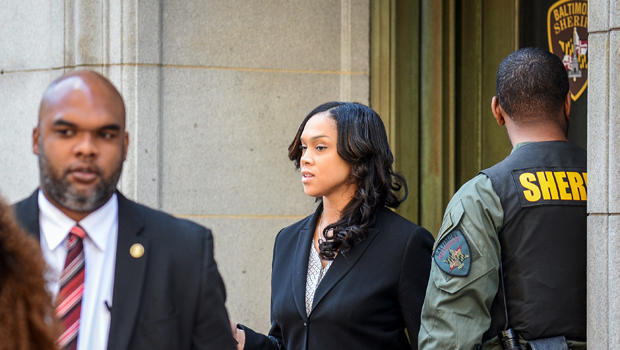Judge blasts prosecutors as new Freddie Gray trial begins
BALTIMORE -- The judge in the trial of an officer charged in the death of a 25-year-old black man whose neck was broken in the back of a police van blasted prosecutors on Thursday for withholding information from the defense.
In a hearing before Officer Caesar Goodson's trial, Baltimore Circuit Judge Barry Williams admonished the state and determined that they violated discovery rules, but he ruled that opening statements could still begin Thursday.
Goodson faces second-degree murder, manslaughter and other charges in the death of Freddie Gray. Prosecutors say Goodson was grossly negligent when he failed to buckle Gray into a seat belt and call for medical aid during Gray's 45-minute ride in the back of Goodson's transport van April 12, 2015. Gray died a week after he suffered a critical spinal injury in the back of Goodson's wagon.
His death prompted protests and civil unrest in the streets of Baltimore, and his name became a national rallying cry for people angry over officers' mistreatment of African-Americans.
Just before Goodson's trial was set to begin, his attorneys filed a motion asking the judge to dismiss the case because prosecutors didn't disclose that they had a meeting with the second prisoner who was in the wagon with Gray. Prosecutors said the meeting didn't produce new information.
During opening statements Thursday, prosecutors said for the first time that Goodson caused Gray's death by deliberately giving him a "rough ride," police lingo for teaching someone a lesson by putting him in a police wagon without a seat belt and driving so erratically that he is thrown around.
"There was no good reason for the defendant not to belt him in, except to bounce him around," Chief Deputy State's Attorney Michael Schatzow said.
During the drive, Goodson ran a stop sign and made a sharp right turn at such high speed that he crossed a double yellow line, Schatzow said, citing video surveillance footage. Gray was thrown against the rear compartment, the prosecutor said.
Goodson attorney Andrew Graham flatly disputed the notion that Gray was deliberately bounced around, saying: "There was no rough ride. It simply didn't happen."
He also said that officers "virtually never" belt prisoners in and that Goodson is such a "slow and cautious" driver that he sometimes lulls his prisoners to sleep.
Graham said Goodson - "a good officer, a gentle man, a nice guy" - didn't belt Gray in because of his "violent and erratic behavior" that included screaming and kicking with such force that the wagon shook. Gray continued to thrash around in the van for several stops, the attorney said.
Goodson, who is black, faces the most serious charges of the six officers arrested in the case. The 46-year-old Goodson could get 30 years in prison if convicted of second-degree murder, or "depraved-heart" murder. He waived his right to a jury trial and opted to let a judge decide his fate.
The trial is being closely watched, not just because Goodson is considered the most culpable of the officers but because prosecutors have yet to secure a conviction in the death that convulsed the city and led to the calling out of the National Guard.
The case against the first officer to go to trial ended in a hung jury in December. Last month, the second officer brought to trial was acquitted.
Gray was arrested after making eye contact with a bicycle officer in a high-crime neighborhood and running away. Once he was handcuffed and put in the van, Gray began to scream and kick so violently he shook the wagon, witnesses have said.
Two blocks away, the wagon stopped again, and three officers took Gray out and put him in leg shackles. They then placed him on the floor of the van, head-first and on his belly. He was never buckled in, as required by department policy.
The prosecution's first witness, police Capt. Martin Bartness, used to oversee the development of the department's policies and testified that officers are required to ensure the safety of prisoners and buckle them in.
Schatzow said that Goodson also failed in his duty when he stopped the van to pick up another prisoner, instead of taking Gray to a hospital.
Graham said that Goodson's supervisors never directed him to seek medical attention for Gray, and that the man wasn't exhibiting any symptoms of distress.
"He did his job, and he followed instructions," Graham said. "Freddie Gray's death was a tragedy, but convicting a good officer just to assign blame would make a tragic situation worse."
Graham told the judge that the assistant medical examiner who prepared Gray's autopsy report and ruled his death a homicide initially told an investigator that it was "a freakish accident" before meeting with prosecutors and changing her mind.
"It was the result of a pressurized investigation," Graham said.
Rough rides, or "nickel rides," so-called after rides at an amusement park, have been the subject of lawsuits in Baltimore and other cities.
Dondi Johnson died of a fractured spine in 2005 after Baltimore police arrested him for urinating in public. Police put him in a van without a seat belt, his hands cuffed behind his back. His family said he was thrown into the opposite wall. The family obtained a $7.4 million judgment, though a cap reduced that to $200,000.
In Philadelphia, police in 2001 barred transportation of prisoners without padding or belts after The Philadelphia Inquirer reported that the city had paid $2.3 million to settle lawsuits over rough rides that paralyzed two people.
